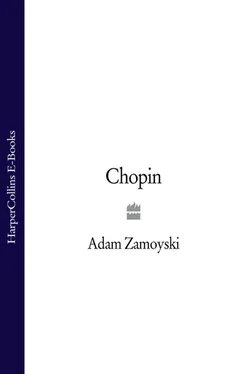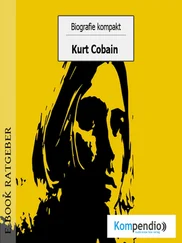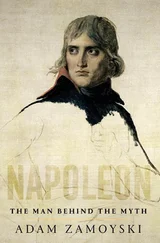The Lycée was housed in a redundant palace built by the Saxon kings of Poland, a grandiose eighteenth-century building with white stucco façades. As there was no accommodation provided for pupils from the country, teachers were encouraged to take apartments in one of the wings of the palace if they were prepared to take in paying boarders. The thrifty Nicolas Chopin seized on this opportunity to increase his income, and moved into the Saxon Palace with his family. He took in six boys, who slept in two rooms and took all their meals with the family.
Nicolas identified himself entirely with his adopted country, and considered himself a Pole. In this he was not being eccentric. Most of his colleagues at the Lycée, from the Rector Samuel Bogumil Linde down, were of foreign origin, and sported names such as Kolberg, Ciampi and Vogel, but had become enthusiastically Polish in outlook. Nicolas Chopin always insisted on speaking Polish, and would not tolerate any other language in his home, even though he spoke it badly and had to resort to French when writing letters.
He was a competent teacher, stern and literal, and was described by one of his pupils as ‘a rather ceremoniously grave personage with a certain elegance of manner’. 5He was not religious, and felt no reverence for the institutions of monarchy and aristocracy, but he was no revolutionary; he believed firmly in acknowledging the ruling power and accepting the limits imposed by the society he lived in. His attitude to art and music was prosaic, although he played the flute a little, until his baby son broke it, and later took up the violin.
The only artistic influence in the household was provided by Justyna, who could play the piano well and sing quite respectably. In contrast to her husband, she was very religious. She was gentle and quiet, but although her role in the family was confined to that of mother and housekeeper, she stood out by her dignified bearing and social graces. Her presence was a considerable comfort to her son, providing as it did a counterbalance to his severe, scrupulous and pedantic father. The eldest daughter, Ludwika, was intelligent and gifted, and also played the piano well from an early age. Izabela, born a couple of years after Fryderyk, was a spirited girl with no intellectual or artistic pretensions, but the youngest, Emilia, was exceptionally gifted, writing poetry by the age of eight.
The little Chopin was of delicate health. Slightly built and chronically underweight, he was prone to all the ailments of childhood. Such staples as smallpox threatened, and it was impossible to avoid contact with the ubiquitous tuberculosis, which would carry away one of his siblings, at least one of his teachers, several of his father’s boarders and eventually his father too. He needed a well-ordered childhood and healthy conditions if he was to survive for long, and the Chopin household provided this.
In 1817 the Lycée was moved to a less grandiose but more appropriate site. This was the Kazimierzowski Palace, a much-reconstructed seventeenth-century former royal residence, a large building with a colonnaded portico flanked by two detached wings. The Chopins occupied an apartment in one of the wings, and now took in ten boarders. The palace was pleasantly situated in what had once been a botanical garden, which sloped away towards the Vistula behind the main building, and the Chopin children, along with those of other teachers and the boarders, made this territory their own.
The various stories which have been dredged up in order to illustrate Chopin’s extraordinary sensitivity as a baby – that he would burst into tears if someone played the piano badly, or, alternatively, sit for hours under the instrument listening in spellbound rapture – can be disregarded. They are the sort of detail that someone ‘remembers’ fifty years later, and even if true are largely meaningless, for there can be few babies who will not either bawl their heads off or else listen in fascination if a musical instrument is played in their presence. One cannot ascribe this to artistic sensitivity at the nappy stage, any more than one can believe a story coined after the composer’s death to the effect that one night he crawled out of his cot, hoisted himself onto the piano stool and began to improvise Polonaises, to the astonishment of his family, drawn from their beds by the sound of music.
Chopin was introduced to the piano by his mother when he was four, and by the age of six he was noted for his ability to play relatively difficult pieces as well as for his gift for playing around with a few notes or a motif and producing simple melodic variations. In 1816 he started taking piano lessons from an old friend of his father’s, the sixty-year-old Adalbert Żywny. Żywny had come to Poland from his native Bohemia and played the violin in a Polish aristocrat’s court orchestra before becoming a freelance music teacher in Warsaw. He was a tall man with a huge purple nose and no teeth. He wore a lopsided, old-fashioned and yellowed wig, and a thickly quilted frock-coat of eighteenth-century cut, which, along with his cravat, his waistcoat and even his vast Hungarian boots, was thoroughly impregnated with snuff. He never bathed, confining himself to a rub-down with vodka on hot summer days, and his only attempt at elegance was a collection of fancy waistcoats. These he had had made up from a job lot of breeches he had bought cheaply when King Stanisław Augustus’s wardrobe was auctioned off after the last partition of Poland in 1795. It is not clear whether this rather curious link with Poland’s glorious past was intentional or not, but Żywny too had become very Polish, not the least of the attributes which endeared him to Nicolas Chopin. Little Chopin adored him, and he became a regular visitor to the household, usually dining with the family and often spending his evenings with them. 6
Żywny was an eighteenth-century musician; his gods were Bach, Haydn and Mozart. The only contemporary composers he acknowledged were Hummel and Moscheles, he had no time for Beethoven or Weber, and positively hated the new Italian school of Spontini and Rossini. His pedagogic method was much as one might expect. ‘Apart from his commodious half-pound snuff-box, the lid of which was decorated with a portrait of Mozart or possibly Haydn, and his large red chequered kerchief,’ wrote one of his pupils, ‘Żywny always had about him a gigantic square pencil which he used for correcting printers’ errors in the scores, or else for rapping his less diligent pupils over the head or knuckles.’ 7He was in many ways an unlikely person to initiate one of the nineteenth century’s most revolutionary composers; yet he proved an ideal teacher, because of his limitations rather than in spite of them.
By the time Żywny had come to teach Chopin, the boy had already developed a familiarity with the keyboard which he himself probably lacked. ‘The mechanism of playing took you but little time, and it was your mind rather than your fingers that strained,’ Nicolas Chopin later wrote to his son, adding that ‘where others have spent days struggling at the keyboard, you hardly ever spent a whole hour at it’. 8Faced with this prodigy, Żywny wisely refrained from interfering. Not being a pianist himself, the only thing he could have taught Chopin was the accepted method of fingering and the traditional hand movements. In view of the boy’s instinctive dexterity, he did not bother with these technicalities. Instead, he concentrated on acquainting his pupil with great music, by guiding him through the keyboard works of Bach, Haydn and Mozart, as well as a little Hummel, explaining the theory behind them as he went.
The result of this unorthodox musical education was that Chopin was allowed to develop his own method of playing, hitting the notes he wanted with the fingers he thought appropriate, not with those specified by textbooks. At the same time he developed a love for and an understanding of the great classical composers which he was never to lose, and which was to set him apart from most of his contemporaries.
Читать дальше












